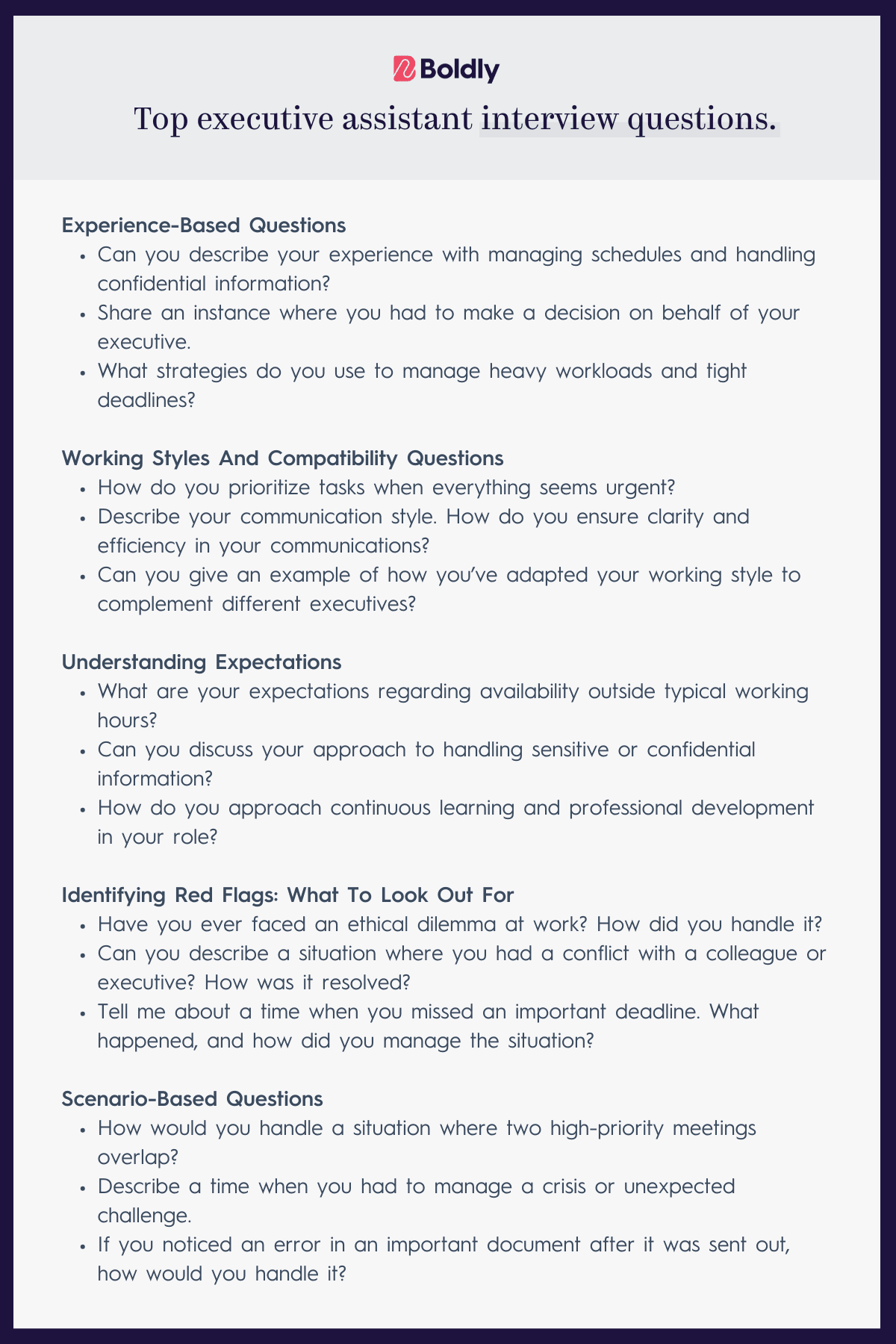Executive assistants are now considered the backbone of companies. If you’ve had a high-level executive assistant, you won’t be too surprised by this news.
With EAs playing such a crucial role in today’s business landscape, knowing the right executive assistant interview questions can make or break your hiring decision. While the phrase “hire slow, fire fast” is common in the business world, the “hiring slow” part becomes challenging when you need to fill an executive assistant position quickly.
When you need an EA, you tend to need one yesterday.
But rushing through interview questions for an executive assistant could mean missing red flags or overlooking the perfect candidate.
As EAs increasingly become the eyes, ears, and glue of organizations, having a strategic approach to your interview questions is more critical than ever.
Your executive assistant will be a crucial part of your team; they’ll be connecting with clients and team members as well as accessing information that requires a high-trust level — you need to make sure they’ll be a good fit right from the start.
Understanding the most effective questions and answers for your interview will help you identify candidates who can truly serve as the backbone of your organization.
Executive Assistant Interview Questions


Here are 15 executive assistant interview questions to help you identify the best candidate. In the next sections, we’ll break these down and provide some tips for what to look for in a candidate’s response.
- Can you describe your experience with managing schedules and handling confidential information?
- Share an instance where you had to make a decision on behalf of your executive.
- What strategies do you use to manage heavy workloads and tight deadlines?
- How do you prioritize tasks when everything seems urgent?
- Describe your communication style. How do you ensure clarity and efficiency in your communications?
- Can you give an example of how you’ve adapted your working style to complement different executives?
- What are your expectations regarding availability outside typical working hours?
- Can you discuss your approach to handling sensitive or confidential information?
- How do you approach continuous learning and professional development in your role?
- Have you ever faced an ethical dilemma at work? How did you handle it?
- Can you describe a situation where you had to balance transparency with confidentiality? How did you approach this challenge while maintaining trust with all parties involved?
- Tell me about a time when you missed an important deadline. What happened, and how did you manage the situation?
- How would you handle a situation where two high-priority meetings overlap?
- How do you approach learning and adapting to new software or digital tools? Can you give a recent example?
- If you noticed an error in an important document after it was sent out, how would you handle it?
Understanding Executive Assistant Questions & Answers
Before diving into specific questions, it’s important to understand what makes for strong responses from candidates. The best answers to interview questions for an executive assistant should demonstrate:
- Specific examples from past experiences
- Clear problem-solving methodologies
- Strong communication and organizational skills
- Understanding of confidentiality and discretion
- Ability to adapt to different executive styles
When evaluating responses, look for candidates who provide concrete examples rather than theoretical answers. This shows real-world experience and practical application of skills.
Experience-Based Executive Assistant Interview Questions
Determining the level of experience and proficiency of a candidate go hand in hand.
Interview questions for executive assistant to the CEO need to pinpoint C-Suite experience, specifically. Not all executive assistants have C-Suite experience, nor have they all handled the role the same in previous positions. Some may have experience, but not extensively.
Here are several executive assistant job interview questions that do more than re-hashing what’s already on their resume and give the candidate a chance to provide context for their experience.
Sample Question: Can you describe your experience with managing schedules and handling confidential information?
- Why ask this? This question hits two core responsibilities that every executive assistant must demonstrate — calendaring and confidentiality. It helps reveal the candidate’s technical skills in calendar management and their understanding of discretion. The answer will show their experience level and their awareness of information security.
- What to listen for: Ideally the candidate will mention specific examples of complex scheduling (such as managing an overbooked calendar, handling a double-booked executive, or finding creative ways to get on a colleague’s calendar) as well as clear protocols for handling sensitive information. Answers should go beyond general statements about being “organized” or “trustworthy.”
Sample Question: Share an instance where you had to make a decision on behalf of your executive.
- Why ask this? The best executive assistants will quickly get a sense of an executive’s priorities and how they like things handled. This question reveals the candidate’s judgment, confidence, and understanding of this important skill set. It also shows how well they can balance being proactive while staying within appropriate boundaries. Their answer will indicate their decision-making process and level of autonomy.
- What to listen for: Listen for how they evaluated the situation, what factors they considered, and whether they kept their executive’s preferences and style in mind.
Sample Question: What strategies do you use to manage heavy workloads and tight deadlines?
- Why ask this? An EA’s ability to handle multiple tasks under pressure is crucial for success. This question reveals their organizational skills, stress management, and the practical tools they use. It also shows whether they have a systematic approach to work.
- What to listen for: Look for specific tools, systems, or methods they use, rather than vague answers about “working harder” or “staying late.” See if they mention troubleshooting with their executive – managing expectations is part of balancing a workload.
Experience-based questions are what we tend to think of when we think of hiring questions, as they are a bit easier to quantify.
Read more: How Much Experience Should Your Executive Assistant Have?
Assessing Executive Assistant Working Styles & Compatibility
Less easy to discover is how well a person will fit in with workplace culture, as well as fitting in with your working style and personality. Amazing experience and long lists of skills won’t overcome a personality or culture clash.
When prepping interview questions for an executive assistant, focus on questions that reveal both technical capabilities and soft skills. The best interview questions will help you understand not just what a candidate can do, but how they approach their work and interact with others.
Sample Question: How do you prioritize tasks when everything seems urgent?
- Why ask this? This question uncovers the candidate’s ability to think strategically and make quick decisions — juggling urgent and competing priorities is often every day when you’re a high-level executive assistant.
- What to listen for: How do they understand the difference between urgent and important tasks, and how do they handle pressure? Listen for their framework for making decisions, how they communicate about priorities, and whether they consider the big-picture impact.
Sample Question: Describe your communication style. How do you ensure clarity and efficiency in your communications?
- Why ask this? Clear communication is vital for an EA who will interact with everyone from CEOs to key stakeholders and big clients. This reveals their awareness of different communication needs and their ability to adapt their style. It also shows their understanding of professional communication standards.
- What to listen for: Pay attention to mentions of adjusting communication style for different audiences and specific examples of how they ensure their messages are understood correctly. Ideally, they will mention representing their executive and matching the tone/formality to the situation.
Sample Question: Can you give an example of how you’ve adapted your working style to complement different executives?
- Why ask this? This question reveals the candidate’s flexibility and emotional intelligence. It shows whether they can observe, understand, and adapt to different leadership styles and personalities. Their answer also indicates their self-awareness and ability to be a true strategic partner.
What to listen for: A great answer will include specific examples of how they identified different work styles and what concrete changes they made to their approach.
Pay attention to the dynamics of the interview itself. If you prefer someone more assertive or outspoken, a candidate who is soft-spoken or more cautious may not be what you’re looking for. If you prefer someone more thoughtful before taking action, someone who snaps off an answer immediately might indicate someone fast to act and not what you’re looking for.
An executive assistant is someone you need to be able to completely trust, and that won’t happen if your personalities aren’t a good fit or your working styles are at odds.
Setting Clear Expectations: Questions To Ask
Some of the most important executive assistant interview questions to ask are about expectations. Fantastic experience and great compatibility, but very different expectations, are a roadmap to disaster.
Creating a comprehensive list of questions should include scenarios that clearly outline job expectations. While you’re interviewing, pay special attention to how candidates’ responses align with your specific needs and workplace culture.
Sample Question: What are your expectations regarding availability outside typical working hours?
- Why ask this? This question helps align expectations and reveals the candidate’s understanding of the role’s demands. It shows their boundaries, flexibility, and how they balance work and personal life. Their answer will indicate whether they’re truly prepared for the reality of executive support.
- What to listen for: Watch for realistic expectations and clear communication about boundaries, while showing reasonable flexibility for genuine emergencies. Make sure their availability will align with the organization’s needs. If you need an assistant who can travel with an executive but the candidate is only available during business hours, the role will not be a good fit.
Sample Question: Can you discuss your approach to handling sensitive or confidential information?
- Why ask this? This reveals the candidate’s understanding of privacy, discretion, and professional ethics. It shows whether they grasp the serious nature of confidentiality in an EA role and have specific practices in place. Their answer indicates their maturity in handling sensitive situations.
- What to listen for: Do they name any specific protocols they follow or their understanding of different types of confidential information? How do they handle requests for information from others?
Sample Question: How do you approach continuous learning and executive assistant professional development in your role?
- Why ask this? This question reveals the candidate’s growth mindset and commitment to improvement. It shows whether they’ll stay current with new tools and best practices. Their answer indicates their potential for long-term value to the organization.
- What to listen for: They should give specific examples of how they’ve developed their skills and what resources they use to stay current in the field.
Sample question: How do you manage the transition between in-person and remote work environments while maintaining the same level of executive support?
- Why ask this? This question reveals the candidate’s adaptability and their understanding of how support needs differ across various work settings. The question also uncovers their ability to maintain continuity of service – a critical skill as many organizations adopt hybrid models. Their answer will indicate their experience with maintaining the same high level of executive support regardless of physical location.
- What to listen for: Look for understanding of virtual collaboration tools, the ability to maintain strong communication regardless of work environment, and examples of successfully supporting executives in hybrid situations.
An executive assistant candidate must be on the same page as you when it comes to what you expect them to accomplish or there will be significant frustrations.
It’s better to lose an excellent candidate now, because of differing expectations in time or responsibility than down the road when they’ve already been onboarded.
See also: 5 Keys To Revolutionize How You Work With An Executive Assistant [Goals + Examples]
Identifying Red Flags: What To Look Out For
Red flags are difficult to spot because the candidate isn’t going to offer them up. They might not even be aware of them, or aren’t aware that the way they worked with a previous executive would not be acceptable with you.
Sample Question: Can you describe a situation where you had to balance transparency with confidentiality? How did you approach this challenge while maintaining trust with all parties involved?
- Why ask this? This reveals the candidate’s moral compass and problem-solving abilities under pressure. It shows how they balance competing interests and maintain integrity. Their answer indicates their judgment in complex situations.
- What to listen for: These are tough situations for most employees, and the executive assistant role is privy to highly sensitive information and decisions. Focus on their decision-making process, understanding of professional boundaries, and ability to maintain relationships while upholding ethical standards.
Sample Question: Can you describe a situation where you had a conflict with a colleague or executive? How was it resolved?
- Why ask this? This question reveals the candidate’s emotional intelligence and conflict resolution skills. It shows their ability to handle workplace tension professionally while maintaining important relationships. Their answer indicates their maturity level and communication skills under stress.
- What to listen for: Look for signs they took responsibility for their part, used professional communication, and focused on solutions rather than blame.
Sample Question: Tell me about a time when you missed an important deadline. What happened, and how did you manage the situation?
- Why ask this? This reveals how the candidate handles mistakes and takes accountability. It shows their problem-solving skills when things go wrong and their ability to learn from errors. Their answer also indicates their honesty and professional maturity.
- What to listen for: Listen for ownership of the mistake, clear steps taken to fix it, and changes made to prevent similar issues in the future.
These can be awkward questions. Watch for inconsistency in responses, both in these questions and throughout the interview. Take note of whether a response is direct and forthcoming, or hedged and evasive.
Pay close attention to how a problem, and its solution, is given context. When they describe scenarios involving previous employment, do they lack discretion in doing so? Do they seem to lack problem-solving skills or an understanding of why a solution worked?
Red flags aren’t just what they’ve done or might do. It may also be in experience gaps that keep you from knowing how they will respond in a particular situation that will happen frequently.
Scenario-Based Questions For Real-World Insights
Presenting scenarios to find out how the executive assistant candidate would respond are a great way to not only see how they think and respond, but also to get insight into how they view the context of an issue.
Sample Question: How would you handle a situation where two high-priority meetings overlap?
- Why ask this? This shows the candidate’s real-world problem-solving abilities and judgment. It reveals their understanding of business priorities and their skills in managing complex scheduling conflicts. Their answer indicates how well they can think on their feet.
- What to listen for: Watch for their process in gathering information, evaluating options, and communicating with all parties involved.
Sample Question: Describe a time when you had to manage a crisis or unexpected challenge.
- Why ask this? Let’s face it — executive assistants are constantly managing various crises and challenges. This question reveals how well the candidate performs under pressure and their ability to handle surprises. It shows their crisis management skills and ability to stay calm while taking action. Their response indicates their resilience and adaptability.
- What to listen for: Look for signs they can think clearly during chaos, take quick but thoughtful action, and keep relevant people informed.
Sample Question: If you noticed an error in an important document after it was sent out, how would you handle it?
- Why ask this? This reveals the candidate’s approach to damage control and professional responsibility. It shows their ability to act quickly while maintaining transparency and professionalism. Their answer indicates how they handle potentially embarrassing situations.
- What to listen for: Listen for immediate action steps, clear communication plans, and ideas for preventing similar errors in the future.
Scenario-based questions show you how they respond under pressure with real conflicts to sift through. They are different from traditional executive assistant interview questions in that instead of focusing on behavior (past experiences), they present hypothetical future experiences that do a good job of assessing a candidate’s capability in high-pressure moments (which they will experience as an EA).
With more and more companies moving toward new technologies and AI tools, you may want to think about how your executive assistant stays current.
Bonus question: How do you approach learning and adapting to new software or digital tools? Can you give a recent example?
- Why ask this? This question reveals the candidate’s ability to evaluate and implement new tools that could improve efficiency. Their answer will also reveal their level of proactivity in seeking solutions versus waiting for direction.
- What to listen for: Listen for their approach to self-directed learning, examples of successfully implementing new tools, and their methodology for evaluating which tools best serve their executive’s needs.
Closing The Interview: Next Steps And Feedback
How you close the interview matters whether you choose to hire the candidate or not. Remember, your reputation as a professional is also being evaluated by the candidate.
- Before closing the interview, allow the candidate to ask you questions. Not only does it give them a sense of ownership of their own interview, but you’ll likely learn something important simply by the questions they ask.
- Tell the candidate what they can expect next from you. Whether it’s offering them a position or informing them otherwise, they should have a clear expectation of what’s next — ideally with a timeline. It can be as simple as: “We’re hoping to fill this position within the next few weeks, so I’ll be in touch soon. When possible, provide honest but discrete feedback in a reasonable so they can learn from the interview and move forward if the position isn’t offered.
- Be sincere and professional as you thank them for their time. Whether you’re conducting a remote interview or in-person, it’s important to compile your notes while the interview is still fresh in your mind before interviewing another candidate.
The truth is, great candidates with amazing experience, ethics, and qualifications may not be a good fit because of compatibility, not because of quality. Acting professionally and reasonably is important no matter the outcome of the interview.
Understanding The Role Of An Executive Assistant
Of course, before you can start interviewing, you’ll need to have a good executive assistant job description. The better the job description, the better you can set expectations before the interview.
An executive assistant handles a broad range of duties that range from admin to deeper integration into projects.
This includes:
- Managing your calendar, including setting up meetings, coordinating events, and arranging travel.
- Sorting and responding appropriately to communications, such as email or phone.
- Arranging and managing travel plans.
- Responding as or on behalf of you to clients and team members.
- Managing internal processes.
- Bookkeeping, such as expense reports.
- Providing research and materials needed for projects and presentations.
An executive assistant is more than someone helping you complete a task list. They are highly integrated into your team and the way you work, meaning that operations and workplace culture can be affected positively or negatively by who you choose as an EA.
How To Skip The Executive Assistant Interview
Short on time? Tired of interviewing or stuck on finding the right fit?
If you need a hire immediately or are looking to bring on several EAs at once, you can find highly qualified executive assistants through the best remote executive companies (although you’ll want to be mindful of legal compliance when you’re considering a remote staffing solution).
At Boldly, you can get ridiculously talented, high-level executive assistants—without the hiring or interviewing. Here’s how it works.




